- Home
- Truman Capote
The Complete Stories of Truman Capote Page 4
The Complete Stories of Truman Capote Read online
Page 4
“It’s a cinch you aren’t going to see how much there is,” I told him. “Why don’t you just let a number pop into your head, and maybe that’ll be the right one.”
“Uh, uh,” he said, “too darn risky. Me, I can’t take no sucha chance. Now, the way I got it figured, there ain’t but one sure-fire thing and that’s to count every nickel and dime.”
“Count!”
“Count what?” asked Hamurabi, who had just moseyed inside and was settling himself at the fountain.
“This kid says he’s going to count how much is in the jug,” I explained.
Hamurabi looked at Appleseed with interest. “How do you plan to do that, son?”
“Oh, by countin’,” said Appleseed matter-of-factly.
Hamurabi laughed. “You better have X-ray eyes, son, that’s all I can say.”
“Oh, no. All you gotta do is be born with a caul on your head. A lady in Louisiana told me so. She was a witch; she loved me and when my ma wouldn’t give me to her she put a hex on her and now my ma don’t weigh but seventy-four pounds.”
“Ve-ry in-ter-esting,” was Hamurabi’s comment as he gave Appleseed a queer glance.
Middy sauntered up, clutching a copy of Screen Secrets. She pointed out a certain photo to Appleseed and said: “Ain’t she the nicest-lookin’ lady? Now you see, Appleseed, you see how pretty her teeth are? Not a one outa joint.”
“Well, don’t you fret none,” he said.
After they left, Hamurabi ordered a bottle of orange Nehi and drank it slowly, while smoking a cigarette. “Do you think maybe that kid’s okay upstairs?” he asked presently in a puzzled voice.
Small towns are best for spending Christmas, I think. They catch the mood quicker and change and come alive under its spell. By the first week in December house doors were decorated with wreaths, and store windows were flashy with red paper bells and snowflakes of glittering isinglass. The kids hiked out into the woods and came back dragging spicy evergreen trees. Already the women were busy baking fruit cakes, unsealing jars of mincemeat and opening bottles of blackberry and scuppernong wine. In the courthouse square a huge tree was trimmed with silver tinsel and colored electric bulbs that were lighted up at sunset. Late of an afternoon you could hear the choir in the Presbyterian church practicing carols for their annual pageant. All over town the japonicas were in full bloom.
The only person who appeared not the least touched by this heartwarming atmosphere was Appleseed. He went about his declared business of counting the jug-money with great, persistent care. Every day now he came to the Valhalla and concentrated on the jug, scowling and mumbling to himself. At first we were all fascinated, but after a while, it got tiresome and nobody paid him any mind whatsoever. He never bought anything, apparently having never been able to raise the two bits. Sometimes he’d talk to Hamurabi, who had taken a tender interest in him and occasionally stood treat to a jawbreaker or a penny’s worth of licorice.
“Do you still think he’s nuts?” I asked.
“I’m not so sure,” said Hamurabi. “But I’ll let you know. He doesn’t eat enough. I’m going to take him over to the Rainbow Café and buy him a plate of barbecue.”
“He’d appreciate it more if you’d give him a quarter.”
“No. A dish of barbecue is what he needs. Besides, it would be better if he never was to make a guess. A high-strung kid like that, so unusual, I wouldn’t want to be the one responsible if he lost. Say, it would be pitiful.”
I’ll admit that at the time, Appleseed struck me as being just funny. Mr. Marshall felt sorry for him, and the kids tried to tease him, but had to give it up when he refused to respond. There you could see him plain as day sitting at the fountain with his forehead puckered and his eyes fixed forever on that jug. Yet he was so withdrawn you sometimes had this awful creepy feeling that, well, maybe he didn’t exist. And when you were pretty much convinced of this he’d wake up and say something like, “You know, I hope a 1913 buffalo nickel’s in there. A fella was tellin’ me he saw where a 1913 buffalo nickel’s worth fifty dollars.” Or, “Middy’s gonna be a big lady in the picture shows. They make lotsa money, the ladies in the picture shows do, and then we ain’t gonna never eat another collard green as long as we live. Only Middy says she can’t be in the picture shows ’less her teeth look good.”
Middy didn’t always tag along with her brother. On those occasions when she didn’t come, Appleseed wasn’t himself; he acted shy and left soon.
Hamurabi kept his promise and stood treat to a dish of barbecue at the café. “Mr. Hamurabi’s nice, all right,” said Appleseed afterward, “but he’s got peculiar notions: has a notion that if he lived in this place named Egypt, he’d be a king or somethin’.”
And Hamurabi said, “That kid has the most touching faith. It’s a beautiful thing to see. But I’m beginning to despise the whole business.” He gestured toward the jug. “Hope of this kind is a cruel thing to give anybody, and I’m damned sorry I was ever a party to it.”
Around the Valhalla the most popular pastime was deciding what you would buy if you won the jug. Among those who participated were: Solomon Katz, Phoebe Jones, Carl Kuhnhardt, Puly Simmons, Addie Foxcroft, Marvin Finkle, Trudy Edwards and a colored man named Erskine Washington. And these were some of their answers: a trip to and a permanent wave in Birmingham, a second-hand piano, a Shetland pony, a gold bracelet, a set of Rover Boys books and a life insurance policy.
Once Mr. Marshall asked Appleseed what he would get. “It’s a secret,” was the reply, and no amount of prying could make him tell. We took it for granted that whatever it was, he wanted it real bad.
Honest winter, as a rule, doesn’t settle on our part of the country till late January, and then is mild, lasting only a short time. But in the year of which I write we were blessed with a singular cold spell the week before Christmas. Some still talk of it, for it was so terrible: water pipes froze solid; many folks had to spend the days in bed snuggled under their quilts, having neglected to lay in enough kindling for the fireplace; the sky turned that strange dull gray as it does just before a storm, and the sun was pale as a waning moon. There was a sharp wind: the old dried-up leaves of last fall fell on the icy ground, and the evergreen tree in the courthouse square was twice stripped of its Christmas finery. When you breathed, your breath made smoky clouds. Down by the silk mill where the very poor people lived, the families huddled together in the dark at night and told tales to keep their minds off the cold. Out in the country the farmers covered their delicate plants with gunnysacks and prayed; some took advantage of the weather to slaughter their hogs and bring the fresh sausage to town. Mr. R. C. Judkins, our town drunk, outfitted himself in a red cheesecloth suit and played Santa Claus at the five ’n’ dime. Mr. R. C. Judkins was the father of a big family, so everybody was happy to see him sober enough to earn a dollar. There were several church socials, at one of which Mr. Marshall came face to face with Rufus McPherson: bitter words were passed but not a blow was struck.
Now, as has been mentioned, Appleseed lived on a farm a mile below Indian Branches; this would be approximately three miles from town; a mighty long and lonesome walk. Still, despite the cold, he came every day to the Valhalla and stayed till closing time, which, as the days had grown short, was after nightfall. Once in a while he’d catch a ride partway home with the foreman from the silk mill, but not often. He looked tired, and there were worry lines about his mouth. He was always cold and shivered a lot. I don’t think he wore any warm drawers underneath his red sweater and blue britches.
It was three days before Christmas when out of the clear sky, he announced: “Well, I’m finished. I mean I know how much is in the bottle.” He claimed this with such grave, solemn sureness it was hard to doubt him.
“Why, say now, son, hold on,” said Hamurabi, who was present. “You can’t know anything of the sort. It’s wrong to think so: you’re just heading to get yourself hurt.”
“You don’t need to preach to me, Mr. Hamurabi. I know what I’m u
p to. A lady in Louisiana, she told me …”
“Yes yes yes—but you got to forget that. If it were me, I’d go home and stay put and forget about this goddamned jug.”
“My brother’s gonna play the fiddle at a wedding over in Cherokee City tonight and he’s gonna give me the two bits,” said Appleseed stubbornly. “Tomorrow I’ll take my chance.”
So the next day I felt kind of excited when Appleseed and Middy arrived. Sure enough, he had his quarter: it was tied for safekeeping in the corner of a red bandanna.
The two of them wandered hand in hand among the showcases, holding a whispery consultation as to what to purchase. They decided finally on a thimble-sized bottle of gardenia cologne, which Middy promptly opened and partly emptied on her hair. “I smells like … Oh, darlin’ Mary, I ain’t never smelled nothin’ as sweet. Here, Appleseed, honey, let me douse some on your hair.” But he wouldn’t let her.
Mr. Marshall got out the ledger in which he kept his records, while Appleseed strolled over to the fountain and cupped the jug between his hands, stroking it gently. His eyes were bright and his cheeks flushed from excitement. Several persons who were in the drugstore at that moment crowded close. Middy stood in the background quietly scratching her leg and smelling the cologne. Hamurabi wasn’t there.
Mr. Marshall licked the point of his pencil and smiled. “Okay, son, what do you say?”
Appleseed took a deep breath. “Seventy-seven dollars and thirty-five cents,” he blurted.
In picking such an uneven sum, he showed originality, for the run-of-the-mill guess was a plain round figure. Mr. Marshall repeated the amount solemnly as he copied it down.
“When’ll I know if I won?”
“Christmas Eve,” someone said.
“That’s tomorrow, huh?”
“Why, so it is,” said Mr. Marshall, not surprised. “Come at four o’clock.”
During the night the thermometer dropped even lower, and toward dawn there was one of those swift, summerlike rainstorms, so that the following day was bright and frozen. The town was like a picture postcard of a Northern scene, what with icicles sparkling whitely on the trees and frost flowers coating all windowpanes. Mr. R. C. Judkins rose early and, for no clear reason, tramped the streets ringing a supper bell, stopping now and then to take a swig of whiskey from a pint which he kept in his hip pocket. As the day was windless, smoke climbed lazily from various chimneys straightway to the still, frozen sky. By mid-morning the Presbyterian choir was in full swing; and the town kids (wearing horror masks, as at Halloween) were chasing one another round and round the square, kicking up an awful fuss.
Hamurabi dropped by at noon to help us fix up the Valhalla. He brought along a fat sack of Satsumas, and together we ate every last one, tossing the hulls into a newly installed potbellied stove (a present from Mr. Marshall to himself) which stood in the middle of the room. Then my uncle took the jug off the fountain, polished and placed it on a prominently situated table. He was no help after that whatsoever, for he squatted in a chair and spent his time tying and retying a tacky green ribbon around the jug. So Hamurabi and I had the rest to do alone: we swept the floor and washed the mirrors and dusted the cabinets and strung streamers of red and green crepe paper from wall to wall. When we were finished it looked very fine and elegant.
But Hamurabi gazed sadly at our work, and said: “Well, I think I better be getting along now.”
“Aren’t you going to stay?” asked Mr. Marshall, shocked.
“No, oh, no,” said Hamurabi, shaking his head slowly. “I don’t want to see that kid’s face. This is Christmas and I mean to have a rip-roaring time. And I couldn’t, not with something like that on my conscience. Hell, I wouldn’t sleep.”
“Suit yourself,” said Mr. Marshall. And he shrugged, but you could see he was really hurt. “Life’s like that—and besides, who knows, he might win.”
Hamurabi sighed gloomily. “What’s his guess?”
“Seventy-seven dollars and thirty-five cents,” I said.
“Now I ask you, isn’t that fantastic?” said Hamurabi. He slumped in a chair next to Mr. Marshall and crossed his legs and lit a cigarette. “If you got any Baby Ruths, I think I’d like one; my mouth tastes sour.”
As the afternoon wore on, the three of us sat around the table feeling terribly blue. No one said hardly a word and, as the kids had deserted the square, the only sound was the clock tolling the hour in the courthouse steeple. The Valhalla was closed to business, but people kept passing by and peeking in the window. At three o’clock Mr. Marshall told me to unlock the door.
Within twenty minutes the place was jam full; everyone was wearing his Sunday best, and the air smelled sweet, for most of the little silk-mill girls had scented themselves with vanilla flavoring. They scrunched up against the walls, perched on the fountain, squeezed in wherever they could; soon the crowd had spread to the sidewalk and stretched into the road. The square was lined with team-drawn wagons and Model T Fords that had carted farmers and their families into town. There was much laughter and shouting and joking—several outraged ladies complained of the cursing and the rough, shoving ways of the younger men, but nobody left. At the side entrance a gang of colored folks had formed and were having the most fun of all. Everybody was making the best of a good thing. It’s usually so quiet around here: nothing much ever happens. It’s safe to say that nearly all of Wachata County was present, but invalids and Rufus McPherson. I looked around for Appleseed but didn’t see him anywhere.
Mr. Marshall harrumphed, and clapped for attention. When things quieted down and the atmosphere was properly tense, he raised his voice like an auctioneer, and called: “Now listen, everybody, in this here envelope you see in my hand”—he held a manila envelope above his head—“well, in it’s the answer—which nobody but God and the First National Bank knows up to now, ha, ha. And in this book”—he held up the ledger with his free hand—“I’ve got written down what you folks guessed. Are there any questions?” All was silence. “Fine. Now, if we could have a volunteer …”
Not a living soul budged an inch: it was as if an awful shyness had overcome the crowd, and even those who were ordinarily natural-born show-offs shuffled their feet, ashamed. Then a voice, Appleseed’s, hollered, “Lemme by … Outa the way, please, ma’am.” Trotting along behind as he pushed forward were Middy and a lanky, sleepy-eyed fellow who was evidently the fiddling brother. Appleseed was dressed the same as usual, but his face was scrubbed rosy clean, his boots polished and his hair slicked back skintight with Stacomb. “Did we get here in time?” he panted.
But Mr. Marshall said, “So you want to be our volunteer?”
Appleseed looked bewildered, then nodded vigorously.
“Does anybody have an objection to this young man?”
Still there was dead quiet. Mr. Marshall handed the envelope to Appleseed, who accepted it calmly. He chewed his under lip while studying it a moment before ripping the flap.
In all that congregation there was no sound except an occasional cough and the soft tinkling of Mr. R. C. Judkins’ supper bell. Hamurabi was leaning against the fountain, staring up at the ceiling; Middy was gazing blankly over her brother’s shoulder, and when he started to tear open the envelope she let out a pained little gasp.
Appleseed withdrew a slip of pink paper and, holding it as though it was very fragile, muttered to himself whatever was written there. Suddenly his face paled and tears glistened in his eyes.
“Hey, speak up, boy,” someone hollered.
Hamurabi stepped forward and all but snatched the slip away. He cleared his throat and commenced to read when his expression changed most comically. “Well, Mother o’ God …” he said.
“Louder! Louder!” an angry chorus demanded.
“Buncha crooks!” yelled Mr. R. C. Judkins, who had a snootful by this time. “I smell a rat and he smells to high heaven!” Whereupon a cyclone of catcalls and whistling rent the air.
Appleseed’s brother whirled round and
shook his fist. “Shuddup, shuddup ’fore I bust every one of your goddamn heads together so’s you got knots the size a musk melons, hear me?”
“Citizens,” cried Mayor Mawes, “citizens—I say, this is Christmas … I say …”
And Mr. Marshall hopped up on a chair and clapped and stamped till a minimum of order was restored. It might as well be noted here that we later found out Rufus McPherson had paid Mr. R. C. Judkins to start the rumpus. Anyway, when the outbreak was quelled, who should be in possession of the slip but me … don’t ask how.
Without thinking, I shouted, “Seventy-seven dollars and thirty-five cents.” Naturally, due to the excitement, I didn’t at first catch the meaning; it was just a number. Then Appleseed’s brother let forth with his whooping yell, and so I understood. The name of the winner spread quickly, and the awed, murmuring whispers were like a rainstorm.
Oh, Appleseed himself was a sorry sight. He was crying as though he was mortally wounded, but when Hamurabi lifted him onto his shoulders so the crowd could get a gander, he dried his eyes with the cuffs of his sweater and began grinning. Mr. R. C. Judkins yelled, “Gyp! Lousy gyp!” but was drowned out by a deafening round of applause.
Middy grabbed my arm. “My teeth,” she squealed. “Now I’m gonna get my teeth.”
“Teeth?” said I, kind of dazed.
“The false kind,” says she. “That’s what we’re gonna get us with the money—a lovely set of white false teeth.”
But at that moment my sole interest was in how Appleseed had known. “Hey, tell me,” I said desperately, “tell me, how in God’s name did he know there was just exactly seventy-seven dollars and thirty-five cents?”
Middy gave me this look. “Why, I thought he told you,” she said, real serious. “He counted.”
“Yes, but how—how?”
“Gee, don’t you even know how to count?”
“But is that all he did?”
“Well,” she said, following a thoughtful pause, “he did do a little praying, too.” She started to dart off, then turned back and called, “Besides, he was born with a caul on his head.”

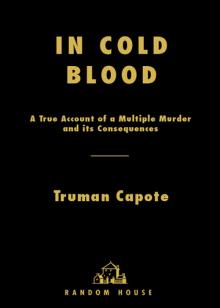 In Cold Blood
In Cold Blood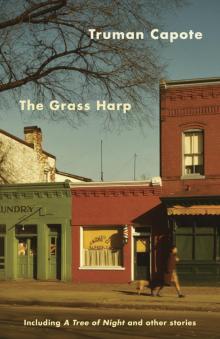 The Grass Harp, Including a Tree of Night and Other Stories
The Grass Harp, Including a Tree of Night and Other Stories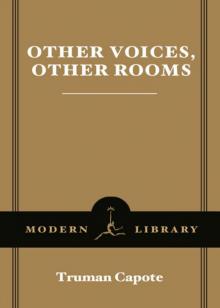 Other Voices, Other Rooms
Other Voices, Other Rooms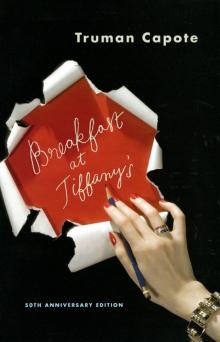 Breakfast at Tiffany's
Breakfast at Tiffany's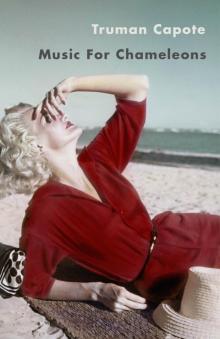 Music For Chameleons
Music For Chameleons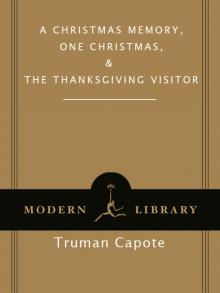 A Christmas Memory, Including One Christmas and the Thanksgiving Visitor
A Christmas Memory, Including One Christmas and the Thanksgiving Visitor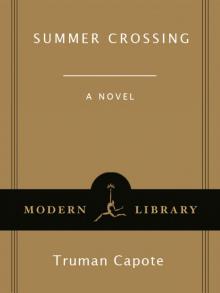 Summer Crossing
Summer Crossing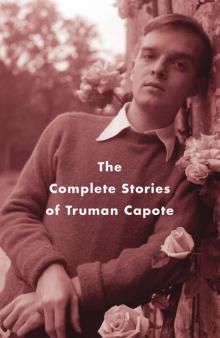 The Complete Stories of Truman Capote
The Complete Stories of Truman Capote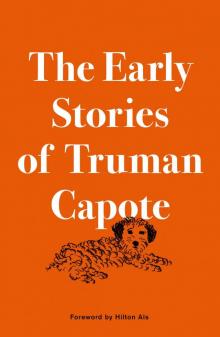 The Early Stories of Truman Capote
The Early Stories of Truman Capote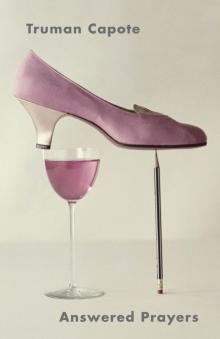 Answered Prayers
Answered Prayers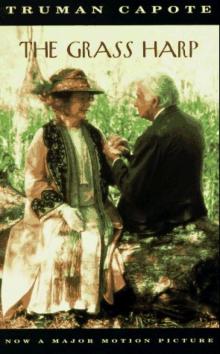 The Grass Harp
The Grass Harp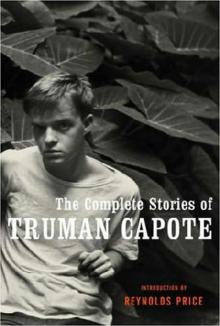 SSC (2004) The Complete Stories of Truman Capote
SSC (2004) The Complete Stories of Truman Capote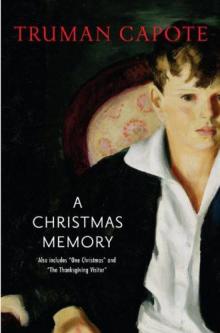 A Christmas Memory
A Christmas Memory